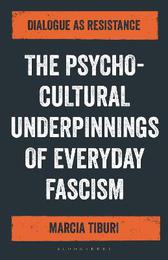
|
The Psycho-Cultural Underpinnings of Everyday Fascism: Dialogue as Resistance
Hardback
Main Details
| Title |
The Psycho-Cultural Underpinnings of Everyday Fascism: Dialogue as Resistance
|
| Authors and Contributors |
By (author) Marcia Tiburi
|
| Physical Properties |
| Format:Hardback | | Pages:216 | | Dimensions(mm): Height 216,Width 138 |
|
| Category/Genre | Social and political philosophy |
|---|
| ISBN/Barcode |
9781350165366
|
| Classifications | Dewey:320.5330981 |
|---|
| Audience | | Tertiary Education (US: College) | |
|---|
|
Publishing Details |
| Publisher |
Bloomsbury Publishing PLC
|
| Imprint |
Bloomsbury Academic
|
| Publication Date |
18 November 2021 |
| Publication Country |
United Kingdom
|
Description
When the Brazilian public intellectual Marcia Tiburi published The Psycho-Cultural Underpinnings of Everyday Fascism in 2015, fascism was yet to return to the public consciousness. But Tiburi was motivated by the kind of fascism she was noticing in daily life - people who fail to practise any kind of reflection about society, betraying a pattern of everyday thought characterized by the repetition of cliches and the angry language of hatred. Three years later, Brazil elected the far-right President Jair Bolsonaro. Now available in English for the first time, this prescient work speaks to our present moment. Fascism is among us once again, evident in the collective expression of exacerbated authoritarianism and the growing hatred against difference and people marked as socially undesirable. Drawing on her own first-hand, brutal encounters, Tiburi connects ways of thinking in Brazil to what is happening around us today and introduces us to the fascist as manipulator, the distorter of other people's speech; fascist as an activist of evil on a daily basis, the one who lives by fostering racism and male-domination and is proud of it. Tiburi takes us beyond formal policies, reinvigorates ideas from the Frankfurt School and refuses to otherize supporters of fascism. Instead she asks what is amiss in their lives that then attracts them to a political project that victimizes them. This powerful book forces us to consider to our actions at a subjective level and changes our way of thinking through issues of hate and divisiveness pervading politics everywhere.
Author Biography
Marcia Tiburi is a Visiting Professor at Universite Paris 8, France. In Brazil, she is the best-selling author of numerous books. She was forced to leave Brazil due to threat of persecution and is now an author in exile. How to Talk to a Fascist is the first English translation of her work.
ReviewsTiburi provides a thought-provoking criticism of the ideas of supporters of the far-right movements that have swept the globe. This insightful book offers readers everywhere a deeper understanding about how to respond to this authoritarian trend and its defenders. * James N. Green, Carlos Manuel de Cespedes Professor of Modern Latin American History, Brown University, USA * An essential book for those concerned with defending democracy against the current onslaught of authoritarianism. Combining the best of the Frankfurt School with personal (sometime life-threatening) experiences with right-wing populism in Brazil, Tiburi skillfully dissects the psycho-cultural underpinnings of 21st century fascism and in the process offers an indispensable guide to those struggling to defeat its rise throughout the world. * Jonathan Warren, Professor in the Henry M. Jackson School of International Studies, University of Washington, USA * At last, this prescient and bold work by Marcia Tiburi, a leading Brazilian intellectual, is available to a broader audience. Brazil's far-right president Jair Bolsonaro "talks" to the public in the language of spectacular violence, of debasement of the other, of flagrant, abject ignorance. Tiburi's book decodes and contextualizes his authoritarianism for us; I only wish it were less relevant. * Amy Chazkel, Associate Professor of History, Columbia University, USA *
|